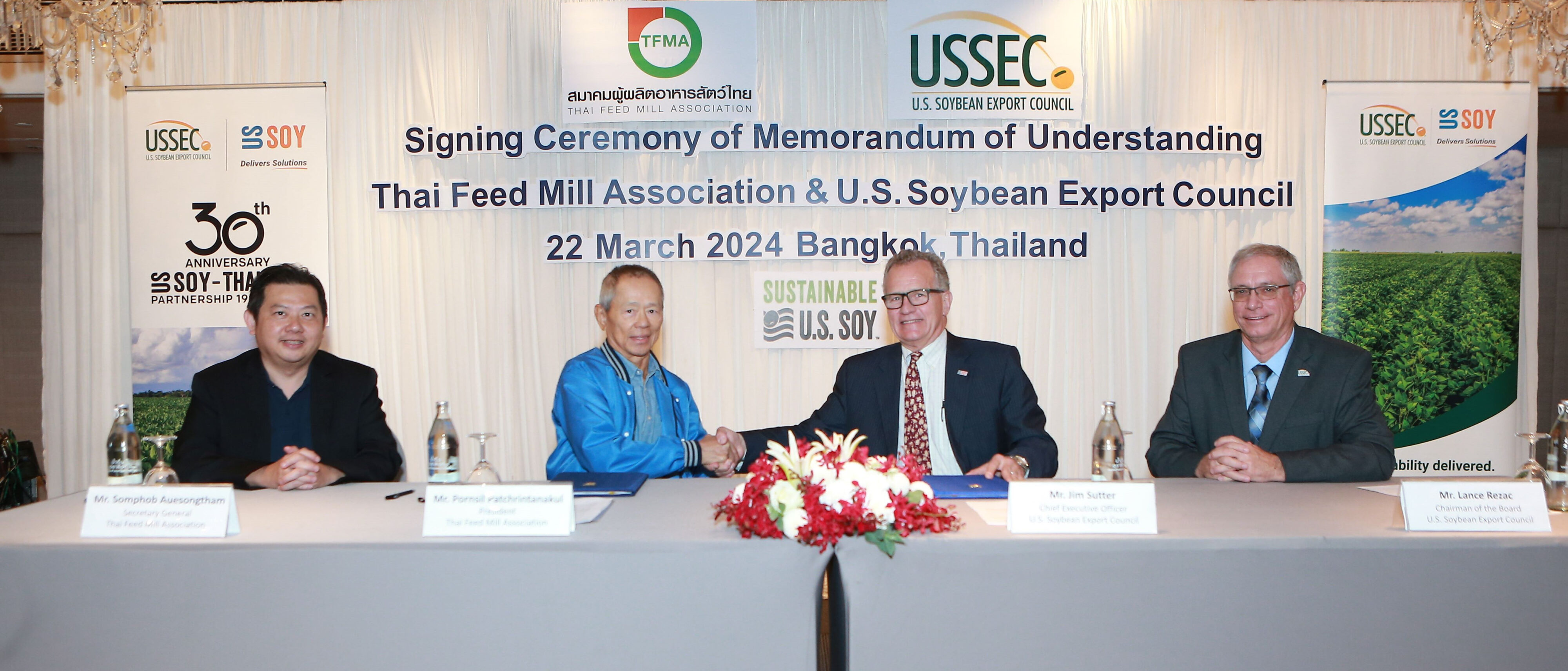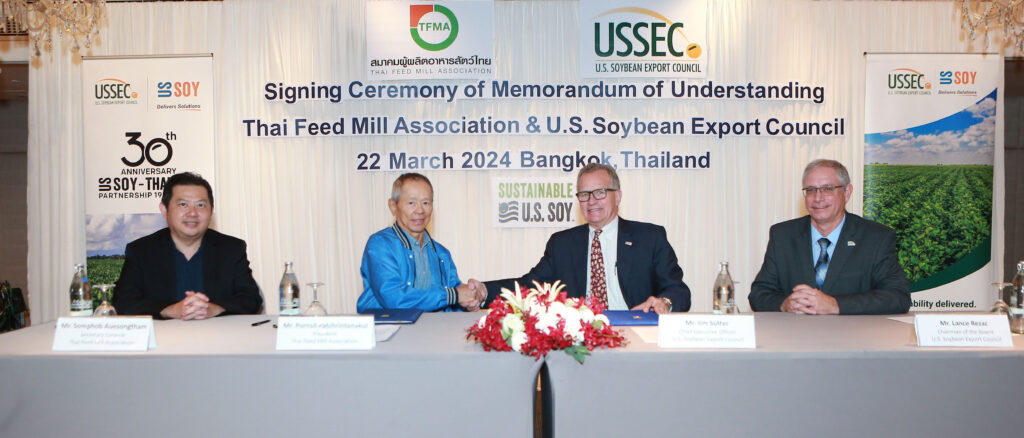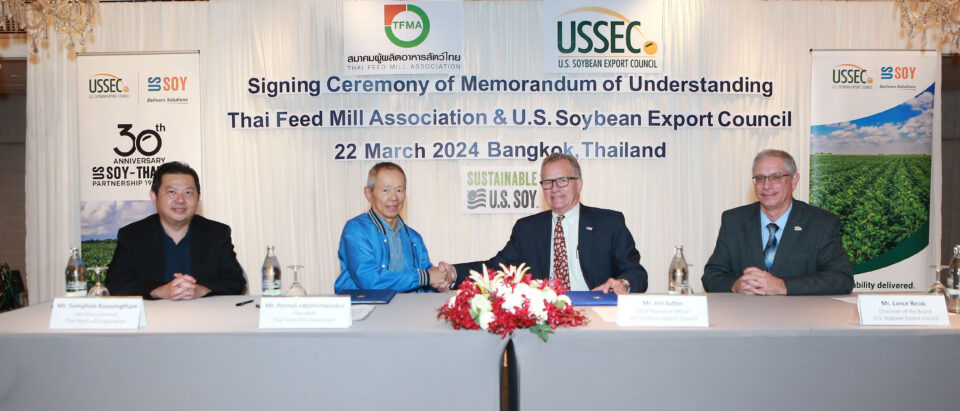
Bangkok, Thailand – The Thai Feed Mill Association (TFMA) and the U.S. Soybean Export Council (USSEC) signed a memorandum of understanding (MoU) to support and advance the sustainable sourcing practices for feed ingredients in Thailand. The MoU aims to establish a sustainable and dependable supply chain for soybeans, soybean meal and soy products for the Thai feed milling community.
Thailand ranks as the world’s third largest chicken meat exporter1, contributing to growth in domestic animal feed production. The total feed demand is also expected to increase by 4.5 percent from 2024 to 20292, with the growing call for more sustainable sourcing in Thailand.
The MoU, which was signed at a ceremony in Bangkok, will further TFMA’s sustainability initiatives through knowledge sharing on sustainability and services including the U.S. Soy Sustainability Assurance Protocol (SSAP), which verifies the sustainability of U.S. Soy products for feed and animal feed uses. This also includes the sharing of technical expertise and best practices in sustainable agricultural practices, environmental conservation, supply chain transparency, and the latest sustainability advancements, while emphasizing the role of U.S. Soy as a source of sustainable protein.
In addition, the MoU will support the adoption and alignment of sustainability metrics and reporting mechanisms with global standards, further bolstering TFMA’s sustainable feed and animal production practices.
Jim Sutter, CEO of USSEC, said: “This year marks 30 years of collaboration between U.S. Soy and Thailand, making the signing of this MoU with TFMA even more significant as USSEC continues to develop strong and enduring relationships between the U.S. and Thailand. As the demand for sustainably sourced products continues to grow in Thailand, we look forward to collaborating with TFMA to pave the way for a resilient future in Thailand's agriculture sector."
Pornsil Patchrintanakul, President of TFMA, emphasized: "Thailand's animal feed producers are committed to transitioning towards green production and strengthening their operations to deliver environmentally friendly products. This MoU will bolster the sustainable sourcing initiatives of our members, ensuring that Thailand's food exports can compete globally, while overcoming challenges in the traceability of raw materials for animal feed. Through our collaboration with USSEC, we aim to enhance the competitiveness of the Thai feed milling industry while advancing our sustainability goals."
Adds Timothy Loh, Regional Director for SEA & Oceania at USSEC, "We have developed a close relationship with the Thai agriculture industry over the past three decades. This MoU with TFMA marks another remarkable milestone in our commitment to promoting sustainable practices while highlighting the environmental advantages of U.S. Soy. We look forward to sharing our trade and technical expertise with the Thai feed milling community, facilitating knowledge transfer processes to enhance the local feed industry and align with Thailand’s vision for economic growth."
U.S. Soy has the lowest carbon footprint compared with soy of other origins, other plant proteins, and vegetable oils.3 Since 1980, U.S. Soy farmers have improved irrigation water use efficiency by 60%, increased land use efficiency by 48%, improved soil conservation by 34%, and increased soy production by 130% using roughly the same amount of land. 4

This press release is partially funded by U.S. Soy farmers, their checkoff, and the soy value chain.
###
About U.S. Soybean Export Council (USSEC): The U.S. Soybean Export Council (USSEC) focuses on differentiating, elevating preference, and attaining market access for the use of U.S. Soy for human consumption, aquaculture, and livestock feed in 80+ countries internationally. USSEC members represent the soy supply chain including U.S. Soy farmers, processors, commodity shippers, merchandisers, allied agribusinesses, and agricultural organizations. USSEC is funded by the U.S. soybean checkoff, USDA Foreign Agricultural Service matching funds, and industry. Visit www.ussec.org for the latest information on U.S. Soy solutions and news about USSEC and U.S. Soy internationally.
About Thai Feed Mill Association (TFMA)
The Thai Feed Mill Association (TFMA) is a private non-profit organization established by a group of entrepreneurs who recognized the importance of fostering collaboration among Thailand's livestock sectors. Registered under the Trade Association Act on December 25th, 1978, the association’s primary objective is to assist members in addressing challenges related to feed and livestock businesses.
TFMA is governed by a Board of Directors, elected from its members every two years. The Board of Directors has established three committees: Marketing, Technical, and Human Resources, and encourages active participation from its members in these committees.
As of 2023, TFMA comprises 51 members and 19 Directors. The Board of Directors has enhanced TFMA's data and information system to benefit members and aims to establish it as the information hub for Thailand's livestock sector, promoting vitality and sustainability across the entire supply chain.
For more information, visit https://www.thaifeedmill.org/about/
- United States Department of Agriculture, Foreign Agriculture Service (January 2024) ↩︎
- Mordor Intelligence: https://www.mordorintelligence.com/industry-reports/thailand-compound-feed-market ↩︎
- Blonk Consultants, Agri-footprint database 5.0 analysis, 2019 ↩︎
- Field Market Report, https://fieldtomarket.org/national-indicators-report/soybeans/ ↩︎
